What is the Mushroom Coffee Market Size?
The global mushroom coffee market size is calculated at USD 3.23 billion in 2025 and is predicted to increase from USD 3.41 billion in 2026 to approximately USD 5.56 billion by 2035, expanding at a CAGR of 5.58% from 2026 to 2035.
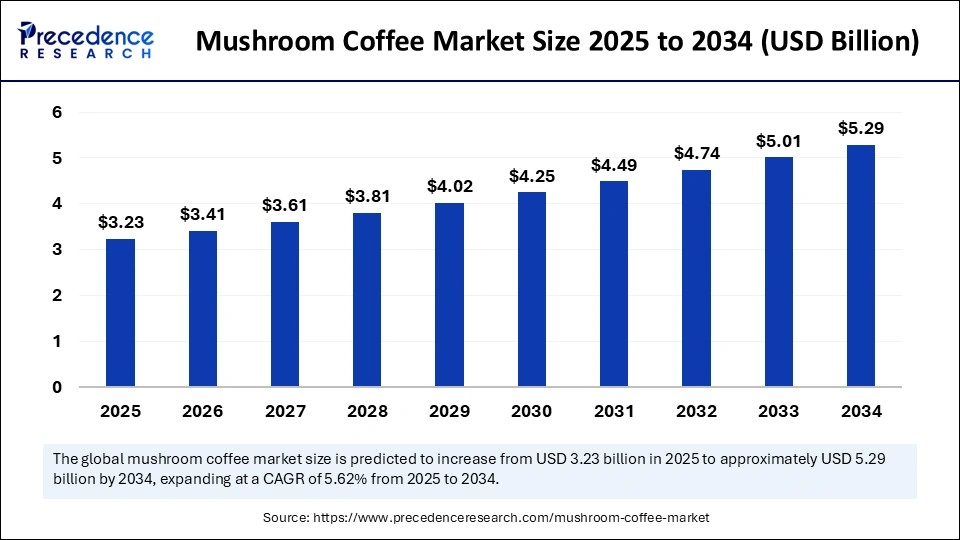
Mushroom Coffee MarketKey Takeaways
- In terms of revenue, the mushroom coffee market is valued at $ 3.23billion in 2025.
- It is projected to reach $ 5.56billion by 2035.
- The market is expected to grow at a CAGR of 5.58% from 2026 to 2035.
- North America held the major revenue share of 29% in 2025.
- Europe is expected to grow at the fastest CAGR of 6.6% between 2026 and 2035.
- By form, the powder segment held the biggest market revenue share of 64% in 2025.
- By form, the grounded segment is expected to expand at the 5.9% fastest CAGR during the forecast period.
- By mushroom extract, the chaga segment contributed the biggest revenue share of 30% in 2025.
- By mushroom extract, the lion's mane segment is projected to grow at a notable CAGR of 6.5% from 2026 to 2035.
- By caffeine content, the caffeinated segment generated the highest revenue share of 74% in 2025.
- By caffeine content, the decaffeinated segment is expected to grow at a CAGR of 6.4% from 2026 to 2035.
- By packaging, the containers/packets segment contributed the largest revenue share of 51% in 2025.
- By packaging, the sachets segment is growing at a CAGR of 6.2% from 2026 to 2035.
- By distribution channel, the supermarkets/hypermarkets segment held the largest revenue share of 47% in 2025.
- By distribution channel, the online segment is poised to grow at a CAGR of 6.3% from 2026 to 2035.
Market Overview
The worldwide mushroom coffee market encompasses the production and distribution of coffee derived from medicinal mushroom extracts, offering health benefits like immune support. Mushroom coffee is a beverage made by blending traditional coffee with powdered extracts of medicinal mushrooms like Chaga, Reishi, Lion's Mane, and Cordyceps. These mushrooms are renowned for their potential health benefits, such as cognitive improvement, immune support, and stress reduction. The market is expected to witness robust growth, spurred by the rising consumer preference for functional beverages as consumers look for natural and holistic ways to boost their well-being.
How does Artificial Intelligence Impact the Mushroom Coffee Market?
Artificial intelligenceis transforming the mushroom coffee market by optimizing mushroom farming, improving quality control, and increasing overall efficiency. AI-powered systems can monitor environmental factors, predict diseases, and automate harvesting, leading to more sustainable and productive mushroom farming. AI systems also allow for monitoring temperature, humidity, and CO2 levels, helping farmers to identify optimal conditions for mushroom growth and predict potential risks. Moreover, AI is leveraged in coffee production to enhance quality control and personalize the brewing process.
What Are the Key Trends in the Mushroom Coffee Market?
- Growing Health-Conscious Consumer Base: The increasing number of consumers is looking for beverages that offer health benefits beyond basic nutrition, such as healthier beverage options and functional foods, driving the need for mushroom coffee.
- Increasing Awareness of Mushroom Benefits: The growing awareness of the health benefits associated with medicinal mushrooms or mushroom coffee, such as their adaptogenic properties, immunity support, and cognitive-enhancing effects, is driving the demand.
- Convenience and Innovation: The development of instant mushroom coffee and innovative flavor profiles cater to diverse consumer preferences and convenience demands for unique and high-quality coffee experiences, making mushroom coffee more accessible and appealing.
- Sustainable Practices: The growing demand for sustainable products and practices encourages manufacturers to adopt sustainable sourcing and production methods, as consumers increasingly support sustainable and organic products by creating opportunities for brands to capitalize on these trends.
Market Outlook:
How will Mushroom Coffee become a Part of the Functional Beverage Market?
- Industry Growth Overview: Mushroom coffee is still an expanding marketplace because of increased health consciousness, along with the trend toward low-acid coffee. The demand for functional nutrition is also growing amongst urban dwellers and working professionals.
- Sustainability Trends: Mushroom coffee is being marketed using sustainable products such as organic mushrooms, recyclable packaging, and responsibly sourced ingredients. It provides environmentally friendly options for customers who desire companies to create long-term, sustainable beverage innovations.
- Global Expansion: Emerging markets around the world are seeing greater amounts of mushroom extract products being shipped to them, as well as large global wellness companies creating new distribution channels within Asia-Pacific, Europe, and LATAM.
- Startup Ecosystem: Several start-ups are leading the charge with new, cleaner, and labeled product formulations, customisable product blends, and science-based health claims, and they are being aided by increasing amounts of venture capital money going into the functional beverage segment.
Marker Scope
| Report Coverage | Details |
| Market Size by 2035 | USD 5.56 Billion |
| Market Size in 2025 | USD 3.23 Billion |
| Market Size in 2026 | USD 3.41 Billion |
| Market Growth Rate from 2026 to 2035 | CAGR of 5.58% |
| Dominating Region | North America |
| Fastest Growing Region | Europe |
| Base Year | 2025 |
| Forecast Period | 2026 to 2035 |
| Segments Covered | Form, Mushroom Extract, Caffeine Content, Packaging, Distribution Channel, and Region |
| Regions Covered | North America, Europe, Asia-Pacific, Latin America, and Middle East & Africa |
Market Dynamics
Drivers
Health and Wellness Trends
The major driver in the mushroom coffee market is the increasing consumer interest in health and wellness. This significantly boosts the demand for functional beverages. Mushroom coffee is perceived as a healthier alternative to traditional coffee due to the health benefits of mushrooms. This trend is further boosted by the inclusion of medicinal mushrooms such as Lion's Mane, Chaga, and Reishi, which offer potential cognitive enhancements, stress relief, and immune support. It also appeals to those seeking caffeine alternatives due to concerns about the side effects of traditional coffee, such as jitters and sleep disruption.
Restraint
Consumer Unwillingness and High Costs
A significant challenge in the mushroom coffee market is consumers unwillingness to adopt mushroom coffee due to a lack of awareness regarding the health benefits and properties of medicinal mushrooms. This is exacerbated by consumers who may be hesitant to try a product that deviates from traditional coffee and might question the efficacy of mushroom coffee due to limited scientific evidence claiming health benefits. The unique taste of mushroom coffee may not attract all consumers. Moreover, mushroom coffee is quite expensive than regular coffee, deterring potential buyers from adopting it.
Opportunity
Demand for Functional Beverages and Personalized Blends
The future opportunity in the mushroom coffee market lies in the rising demand for functional beverages and personalized blends, along with the extension of distribution channels. This trend is further enhanced by the shift toward more functional mushroom coffee blends, which incorporate adaptogens, herbs, and superfoods. Such options facilitate customization based on individual health and taste preferences. Additionally, companies are exploring ready-to-drink options and instant coffee formats for greater convenience and accessibility.
Segment Insights
Form Insights
Why Did the Powder Segment Dominated the Market in 2025?
The powdered segment generated the largest revenue share of 64% in the mushroom coffee market in 2025, owing to its convenience, ease of preparation, and longer shelf life, which prevents oxidation and flavor degradation compared to other forms. The powdered mushroom coffee allows for instant preparation without the need for grinding, brewing, or specialized equipment, making it a quick and accessible beverage option for busy consumers. This convenience, combined with the health benefits associated with mushroom extracts, facilitates a range of potential advantages, such as improved immunity and stress reduction, driving its popularity further.
The grounded segment is projected to grow at a CAGR of 5.9% during the forecast period. This is mainly due to the ability of grounded coffee to blend seamlessly with traditional coffee. It offers consumers a familiar and robust flavor profile, allowing for an easy transition into the functional beverage space. The ground format also enables customization, so coffee enthusiasts can experiment with different brewing techniques and grind sizes to achieve their preferred taste, providing a level of personalization for a joyful experience.
Mushroom Extract insights
How Chaga Segment Dominated the Market in 2025?
The chaga segment dominated the mushroom coffee market with the largest revenue share of 30% in 2025. This is mainly due to the perceived health benefits and unique flavor profile of chaga mushroom extract, particularly its earthy, nutty, and slightly sweet taste when combined with coffee. The extract is well-known for its potential to improve the immune system, reduce inflammation, and provide antioxidant protection. This, along with the growing demand for healthier and functional beverages, aids the body in adapting to stress and enhances overall resilience, making Chaga a favored choice for mushroom coffee.
The lion's mane segment is growing at a CAGR of 6.5% in the upcoming period. The growth of the segment is attributed to its easy cultivation practices, widespread availability, affordability, and potential health benefits, including cognitive enhancement, such as supporting memory and nerve regeneration. Lion's mane is not only a preferred choice for individuals following a vegan diet but also for consumers seeking gluten-free options.
Caffeine Content Insights
What Made the Caffeinated the Dominant Segment in 2025?
The caffeinated segment captured the largest revenue share of 74% in 2025. This is mainly due to an increased preference for caffeinated beverages, a desire for a robust and energizing experience, and the fact that many people enjoy the taste of coffee, which is enriched by caffeine, making it richer and more robust. Therefore, coffee is commonly regarded as a daily ritual. The stimulating effects of caffeine play a significant role in energizing consumer experiences, driving the segment's growth.
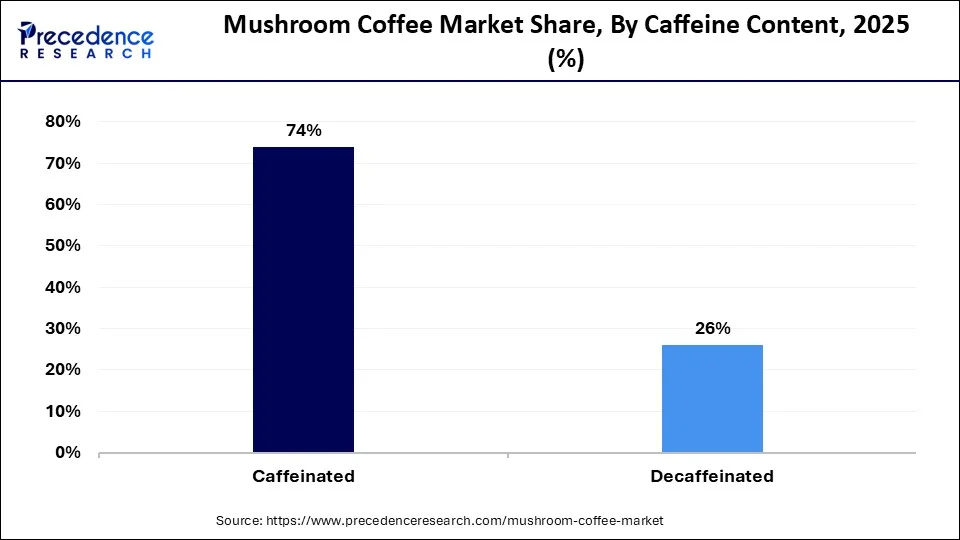
The decaffeinated segment is projected to grow at a CAGR of 6.4% during the projection period. The growth of the segment is driven by rising health consciousness and increasing demand for alternative beverages. People have become more aware of the benefits of mushrooms, such as reduced inflammation and improved sleep. Moreover, consumers are increasingly seeking healthier beverage options that provide potential health benefits along with the enjoyment of a coffee beverage, making mushroom coffee an appealing choice. Furthermore, it is recognized for having lower caffeine content than regular coffee, making it a suitable alternative for caffeine-sensitive individuals and those looking to manage their caffeine intake.
Packaging Insights
What Made Containers/Packets the Dominant Segment in 2025?
The containers/packets segment held the major market share of 51% in 2025 due to its ability to preserve freshness and convenience, particularly in the form of resealable packets. These resealable packets effectively prevent oxygen and moisture from entering, thereby avoiding degradation of coffee quality. This is crucial for mushroom coffee, which may possess unique flavor profiles sensitive to exposure. Additionally, the prevalence of this segment reflects the trend toward single-serve options, appealing to consumers seeking added convenience.
The sachets segment is expected to grow at the fastest CAGR of 6.2% during the forecast period, primarily due to their convenience, portability, and ease of use. These features make sachets ideal for busy consumers and on-the-go lifestyles, facilitating a quick and easy way to enjoy mushroom coffee with minimal preparation. There is also a growing demand for biodegradable and compostable sachet packaging, further enhancing their appeal and aligning with the increasing need for eco-friendly products.
Distribution Channel Insights
Why Did the Supermarkets/Hypermarkets Segment Dominate in 2025?
The supermarkets/hypermarkets segment accounted for the major revenue share of 47% the mushroom coffee market in 2025 because of their widespread accessibility, diverse product offerings, and established brand recognition. These stores are strategically located in accessible areas, making it convenient for a broad range of consumers to purchase mushroom coffee. This enables consumers to easily find and compare different mushroom coffee blends, brands, and formats in one place. Additionally, supermarkets and hypermarkets frequently offer in-store promotions, discounts, and deals, which further expedite consumer purchases and access.
The online segment is representing a highest CAGR of 6.3% during the projection period, driven by its convenience and wider reach. Consumers increasingly prefer online shopping for purchasing mushroom coffee due to easy access, a wide variety of product options, and the ability to quickly gather information and reviews, showcasing a broader range of mushroom coffee blends and related products compared to traditional retail channels. This trend also benefits brands by enabling them to tap into new marketplaces. Online retails offer high discounts and personalized shopping experiences, attracting more consumers.
Regional Insights
What is the U.S. Mushroom Coffee Market Size?
The U.S. mushroom coffee market size was exhibited at USD 618.22 million in 2025 and is projected to be worth around USD 1,088.09 million by 2035, growing at a CAGR of 5.82% from 2026 to 2035.
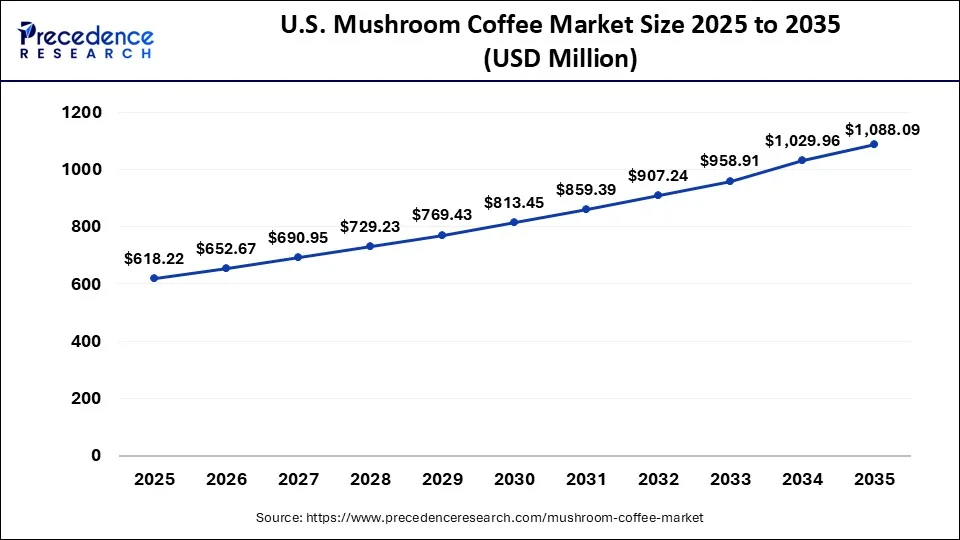
How does North America Dominate the Mushroom Coffee Market in 2025?
North America dominated the global mushroom coffee market in 2025 by holding more than 29% of revenue share, driven by a strong coffee culture, increasing health awareness, and a consumer base open to new food and beverage trends. Consumers are attracted to the potential health benefits of medicinal mushrooms, causing a rise in mushroom coffee brands and product offerings. Mushroom coffee brands such as Four Sigmatic have expanded from niche wellness stores to national grocery chains, showcasing their growing mainstream appeal, along with recent innovations like the launch of functional mushroom-infused coffee ranges and blends that combine mushrooms with other adaptogens.
The U.S Mushroom Coffee Market Trends
The U.S. plays a pivotal role in the North American mushroom coffee market. This is due to the fact that the country has a significant consumer base of coffee, propelled by a robust coffee culture and rising health consciousness. The U.S. serves as a hub for innovation in the mushroom coffee market, with companies developing new products and formulations. The U.S. has a vibrant coffee culture, which creates a fertile ground for the adoption of new trends like mushroom coffee, as consumers increasingly seek natural and healthy alternatives, including mushroom coffee, for their health and wellness benefits.
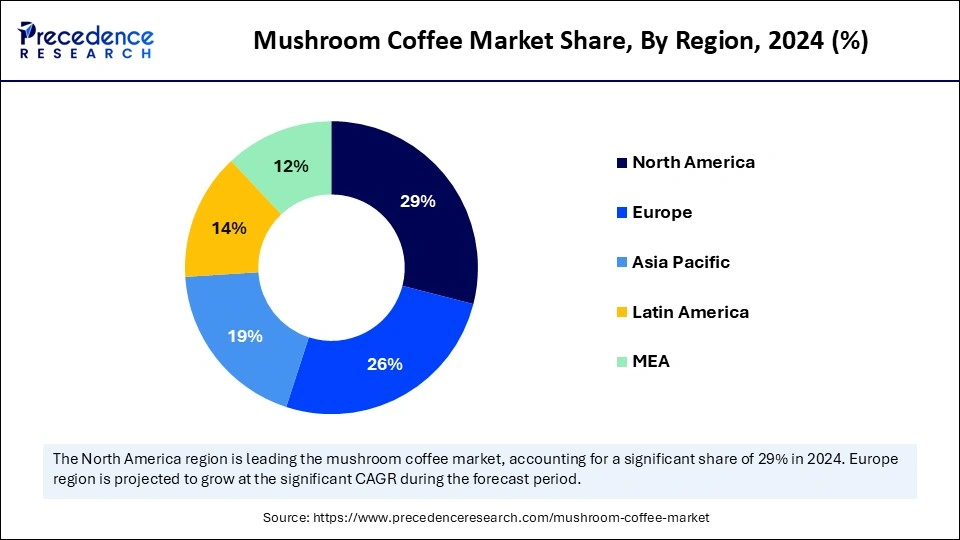
How Does Europe Impact the Mushroom Coffee Market?
Europe is growing at a fastest CAGR of of 6.6% during the forecast period. This is due to an increasing focus on health and wellness, heightened consumer awareness about the health benefits of mushrooms, and a demand for sustainable and natural beverages. This growth is further fueled by impactful marketing and celebrity endorsements that enhance the appeal of mushroom coffee as consumers look for functional beverages with potential health benefits.
Europe: Emerging Wellness Functionality
Europe has a growing demand for mushroom coffee. Several factors are driving this trend, including continued growth in the organic food sector, increased numbers of vegan consumers, and a growing interest in cognitive function beverages. The demand for mushroom coffee is highest in Germany, the United Kingdom, and the Nordic Regions. Germany is the fastest-growing market for mushroom coffee; the country has a well-established market for natural functional food products and a culture that supports quality, premium coffee products.
Germany Mushroom Coffee Market Trends
Germany plays a significant role in the European mushroom coffee market. Being a crucial coffee trade hub in Europe and the second-largest re-exporter of green coffee beans, Germany represents lucrative opportunities for innovation. Mushroom drinks, including mushroom coffee and tea, are gaining traction in the country, supporting the growth of the market.
What Opportunities Exist in the Mushroom Coffee Market within Asia Pacific?
Asia Pacific is emerging as an important player in the global market due to its substantial production rates, large consumer base, and significant growth potential, especially in countries like China, India, and Japan, driven by urbanization and the increasing adoption of functional beverages. Moreover, the region has a rich heritage of using mushrooms in various traditional practices, contributing to the rising demand for mushroom coffee. The growth of the market within the region is also attributed to the rising coffee culture, along with rising government initiatives and collaborations focused on enhancing consumer awareness of the health benefits of mushrooms and their applications in beverages.
Latin America: Innovation in Functional Drinks:
The increasing demand for healthier alternatives to traditional coffee was driving the demand for mushroom coffee in Latin America. Furthermore, the region has a long-standing history of health-related Retail and Products, which also supports this growing trend. The fastest-growing market for mushroom coffee in Latin America is Brazil; the growth is being driven by many start-up businesses that provide functional beverages, along with a growing trend of urban wellness.
Middle East and Africa: Emerging Markets for Wellness Functional Beverage.
The Middle East and Africa have seen an increase in health-conscious, wealthier, and more health-aware younger urban populations, along with growth in the café culture; the combination of these factors has all contributed to the growth of the market for premium functional wellness beverages.
The fastest-growing country for mushroom coffee in the Middle East and Africa is the United Arab Emirates. The country's relatively high disposable income, along with a high demand for imported premium wellness functional products, drives growth.
Evaluating the Value Chain of the Mushroom Coffee Market:
- Sourcing Raw Materials: Growing and harvesting functional mushrooms requires controlled conditions and certification for quality.
Key Companies: Reishi from Hokkaido, Nammex, and Dacon. - Processing and Manufacturing: Combining specialty coffee beans with mushroom extracts while optimizing flavors.
Key Companies: Four Sigmatic, Om Mushroom Superfood, and Mud/Wtr. - Distribution and Retailing: The direct-to-consumer business model and availability at grocery stores that sell natural products and retailers who focus on wellness.
Key Companies: Amazon Wellness, Thrive Market, and Whole Foods Market.
Mushroom Coffee Market Companies
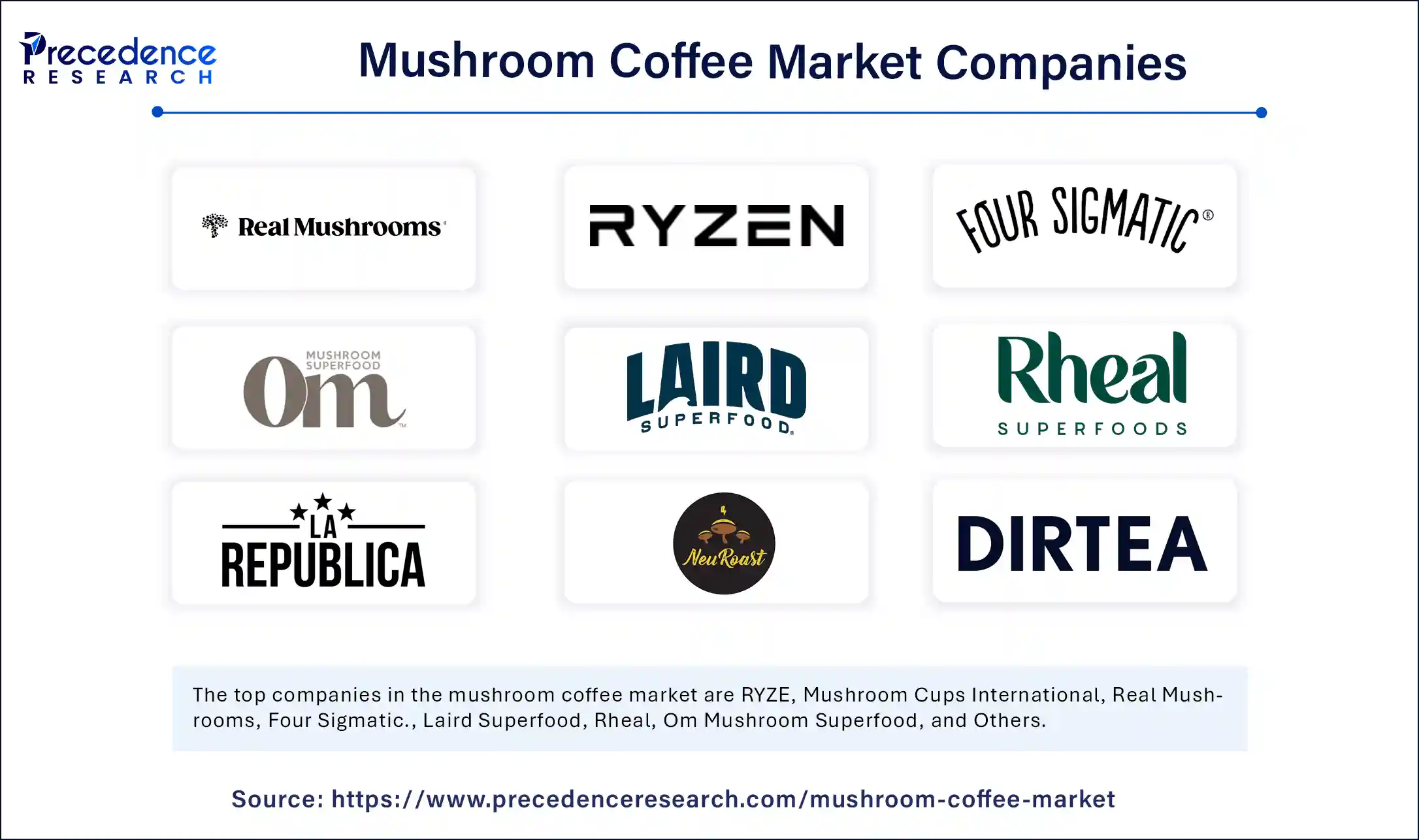
- RYZE
- Mushroom Cups International
- Real Mushrooms
- Four Sigmatic.
- Laird Superfood
- Rheal
- Om Mushroom Superfood
- NeuRoast
- DIRTEA
- La Republica Superfoods
Industry Leader's Announcement
- In July 2024, ADIA Nutrition Inc. announced the acquisition of Biolete LLC, a pioneering company in the development of protein coffee with mushrooms. The acquisition enables ADIA to expand its portfolio and provide original solutions to meet the evolving needs of its customers. Larry Powalisz, CEO of ADIA Nutrition Inc., stated, "Biolete's innovative approach to combining the benefits of protein and mushrooms in a delicious coffee beverage aligns perfectly with our mission to revolutionize the supplement industry and empower individuals to prioritize their health and well-being. We are excited to leverage our combined resources and expertise to bring Biolete's exceptional product to a wider audience."
(Source: https://www.newsfilecorp.com)
Recent Developments
- In May 2025, North Spore launched its first-ever mushroom coffee product. This coffee is created by pairing antioxidant-rich coffee with 100% organic fruiting body extracts from five adaptogenic mushrooms like Lion's Mane, Chaga, Reishi, Cordyceps, and Turkey Tail with facilitating all the benefits of caffeine, plus stress reduction, immunity support, mood enhancement, and mental clarity.
(Source: https://www.themanual.com) - In May 2025, a Norfolk health brand partnered with a coffee company to launch a new range of mushroom supplement-infused coffee. The natural supplement brand Puurfection and The Baytown Coffee Company of Yorkshire created a coffee made with Lion's Mane, a mushroom variety thought to have a range of health benefits, to deliver a morning caffeine hit and lasting energy during the entire day without any additives or fillers.
(Source: https://www.wymondhamandattleboroughmercury.co.uk) - In June 2024, Artizan Coffee Roasters introduced the world's first USDA Organic Mushroom Coffee Capsules compatible with Nespresso machines. Combining organic functional mushrooms with organic specialty-grade Arabica coffee, these 100% home-compostable capsules facilitate an unparalleled wellness experience by setting a new standard in this space.
(Source: https://www.prweb.com) - In September 2023, ORGANO introduced an innovative reformulation of its Nespresso-compatible mushroom-enhanced Italian specialty coffee blend, promising to bring the treasures of the earth to the people of the world. This coffee blend meets the range of flavor and intensity that coffee connoisseurs seek in their espresso by utilizing the highest quality organic Ganoderma mushroom.
(Source: https://www.prnewswire.com)
Segments Covered in the Report
By Form
- Grounded
- Powder
By Mushroom Extract
- Lion's mane
- Chaga
- Cordyceps
- Reishi
- Others
By Caffeine Content
- Caffeinated
- Decaffeinated
By Packaging
- Sachets
- Containers/Packets
- Coffee Pods
By Distribution Channel
- Supermarkets/Hypermarkets
- Convenience Stores
- Online
By Region
- North America
- Europe
- Asia Pacific
- Latin America
- Middle East and Africa
 Get a Sample
Get a Sample
 Table Of Content
Table Of Content


